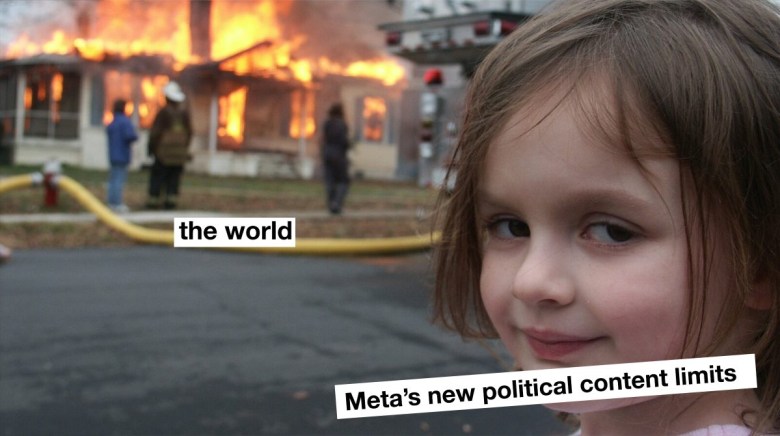
Technology conglomerate Meta quietly rolled out a new feature on Instagram and Threads last week that automatically limits general “political content” from user algorithms. The new update represents a covert expansion of the company’s February notice about suspending recommended political content from accounts that users were not already following.
Meta’s feature also follows years of complaints from artists and activists who have faced content suppression and account suspensions or bans after being flagged by Instagram’s content moderation tools. Similar concerns about visibility and artistic freedom emerged in 2021 after Instagram enabled a default setting that restricted sensitive content, defined as “posts that don’t necessarily break [platform] rules, but could potentially be upsetting to some people,” without notice. Since 2020, the advocacy group Don’t Delete Art has been raising awareness about Instagram and Facebook’s aggressive content moderation and working to thwart bills that would enshrine such limitations into law under the guise of children’s online safety.
Head of Instagram Adam Mosseri said that the goal is “to preserve the ability for people to choose to interact with political content, while respecting each person’s appetite for it.” But some Instagram users have expressed concerns about the new feature’s arrival ahead of the 2024 Presidential election and amid mounting international political crises and are sharing infographics on how to opt out of the default setting.
“I think the need to censor ‘political’ information speaks volumes to the fear the corporate, neoliberal, capitalist classes have for the impact the masses can make when we collectivize, when we share, and when we build within networks we create,” Shawn Escarciga, a multidisciplinary artist and community organizer under the name Miss Lady Salad whose digital collages sarcastically tackle political discourse on social media, told Hyperallergic.
Escarciga also questioned what Meta’s parameters were for political content, bringing up critical commentary about topics like rent hikes, social action awareness posts, and the use of the watermelon emoji, a symbol of solidarity with the struggle for Palestinian liberation, among other examples.
“It’s scary, but I’m also inspired by the collective impact that something as simple as sharing a meme, a crowdfunding effort, resources for tapping into real-life actions can have on our wider movements towards liberation and justice,” Escarciga said, highlighting how social media has become inextricable from activism and even daily life.
“So, we take control of what information is shared, we push back against neoliberal and fascist propaganda, and we get political and ‘political’ in spaces that some people are maybe using simply to share images of their dinners,” they continued. “And it works.”
Meta has not yet responded to Hyperallergic‘s request for comment.
Zach Feuer, a New York-based art worker with almost 50,000 Instagram followers, told Hyperallergic that he primarily uses his platform for activism, awareness, and advocacy and that his account engagement “dropped significantly since three days ago.” He said he has to rethink his crowdfunding approach as he would use Instagram to sell off artwork from his collection — especially for helping Palestinians exit Gaza.
“I depend on direct reports from Palestinians to get my news these days, and I was really shocked when Facebook briefly suspended Motaz Azaiza’s account, given that he’s one of the most followed and prominent Palestinian reporters today,” Feuer highlighted. “These social media platforms aren’t meant to be tools for any form of resistance. They are tools for earning capital through capital. But if I’m able to change the mind of just one person, then I’ll continue with what I’m doing.”
Since Hamas’s October 7 attack and Israel’s ongoing assault on Gaza, cultural institutions have revoked opportunities for art workers publicly expressing support for Palestine on social media. While German organizations have been notoriously staunch about artists’ online activity, retaliatory suppression of pro-Palestine creatives is unfolding on an international level — though it has done little to prevent them from organizing and speaking out.
Diana Weymar, the textile artist behind the viral and collaborative Tiny Pricks Project materially archiving the impact of Trump’s presidency, among other political content, said that she “couldn’t do what she does” without Instagram.
“Instagram has opened up a world of opportunity for artists and activists like me that did not exist before,” Weymar told Hyperallergic, though she noted that after one deletion of her account (and subsequent restoration), she’s now acutely aware that her profile doesn’t really belong to her at the end of the day. The artist also underscored that Instagram is the most affordable way for her to share her work — it’s free.
In spite of concerns about content moderation and being silenced, especially within the context of the forthcoming election, Weymar said that she may or may not be attuned to the tangible impact of Meta’s new feature but will continue her Tiny Pricks Project and “hope that it will reach the people it needs to reach.”